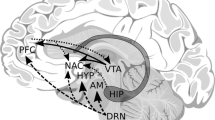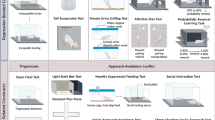Abstract
Rationale
Response inhibition, a primary symptom of many psychiatric disorders, is mediated through a complex neuropharmacological network that involves dopamine, serotonin, glutamate, noradrenaline, and cannabinoid mechanisms. Recently, we identified an opioidergic contribution to response inhibition by showing that deletion of mu or delta opioid receptors in mice alters motor impulsivity.
Objectives
We investigated this phenomenon further by testing whether pharmacological activation of opioid receptors disrupts the ability to inhibit a motor response.
Methods
Long–Evans rats were trained to withhold a lever-pressing response for sucrose until a discriminative stimulus (lever light) was presented. The delay to the discriminative stimulus (1 to 60 s) was varied, so animals could not predict, on any given trial, the length of the pre-response phase. Motor impulsivity was assessed as the inability to inhibit lever pressing prior to the discriminative stimulus. Rats were tested following an injection of the mu opioid receptor agonist morphine (0, 0.5, 1, 2, 4, 6, 8, or 10 mg/kg) or the delta receptor agonist SNC80 (0, 2.5, 5, or 10 mg/kg).
Results
SNC80 (10 mg/kg) increased premature responses and locomotor activity, but had no effect on the speed of responding or non-reinforced presses. The SNC80-induced decrease in accuracy was blocked by the delta opioid receptor antagonist naltrindole. Morphine had no effect on accuracy but increased locomotor activity (2 mg/kg).
Conclusions
These findings point to a role for delta, but not mu, opioid receptors in disinhibition as measured in the response inhibition task. The results appear to contradict those of previous opioid receptor deletion studies; possible sources of these discrepant results are discussed.




Similar content being viewed by others
References
American Psychiatric Association (1994) Diagnostic and statistical manual of mental disorders, 4th edn. Prometheus Books, Amherst
Bickel WK, Marsch DM (2001) Toward a behavioral economic understanding of drug dependence: delay discounting processes. Addiction 96:73–86
Bowers BJ, Wehner JM (2001) Ethanol consumption and behavioral impulsivity are increased in protein kinase Cy null mutant mice. J Neurosci 21:RC180
Broom DC, Jutkiewicz EM, Folk JE, Traynor JR, Rice KC, Woods JH (2002a) Neuropeptidic delta-opioid receptor agonists reduce immobility in the forced swim assay in rats. Neuropsychopharmacoloy 26:744–755
Broom DC, Jutkiewicz EM, Rice DC, Traynor JR, Woods JH (2002b) Behavioral effects of delta-opioid receptor agonists: potential antidepressants? Jpn J Pharmacol 90:1–6
Clark L, Robbins TW, Ersche KD, Sahakian BJ (2006) Reflection impulsivity in current and former substance abusers. Biol Psychiatry 60:515–522
Evenden JL (1999) Varieties of impulsivity. Psychopharmacology 146:348–361
Everitt BJ, Belin D, Economidou D, Pelloux Y, Dalley JW, Robbins TW (2008) Review. Neural mechanisms underlying the vulnerability to develop compulsive drug-seeking habits and addiction. Philos Trans R Soc Lond 363:3125–3135
Filliol D, Ghozland S, Chluba J, Martin M, Matthes HWD, Simonin F, Befort K, Gaveriaux-Ruff C, Dierich A, Le Meur M, Valverde O, Maldonado R, Kieffer BL (2000) Mice deficient for delta- and mu-opioid receptors exhibit opposing alterations of emotional responses. Nat Genet 22:195–200
Forman SD, Dougherty DM, Casey BJ, Siegle GJ, Braver TS, Barch DM, Stenger VA, Wick-Hull C, Pisarov LA, Lorenson E (2004) Opiate addicts lack error-dependent activation of rostral anterior cingulate. Biol Psychiatry 55:531–537
Gaveriaux-Ruff C, Kieffer BL (2007) Conditional gene targeting in the mouse nervous system: insights into brain function and diseases. Pharmacol Ther 113:619–634
Gingrich JA, Hen R (2001) Dissecting the role of the serotonin system in neuropsychiatric disorders using knockout mice. Psychopharmacology 155:1–10
Greenhouse SW, Giesser S (1959) On methods in the analysis of profile data. Psychometrika 24:95–112
Hayton SJ, Lovett-Barron M, Dumont EC, Olmstead MC (2010) Target-specific encoding of response inhibition: increased contribution of AMPA to NMDA receptors at excitatory synapses in the prefrontal cortex. J Neurosci 30:11493–11500
Hayton SJ, Olmstead MC (2009) Fractionating animal models of impulsivity: Reconciling the neurochemistry of disinhibition. In: Granon S (ed) Endophenotypes of psychiatric and neurodegenerative disorders in animal models. Transworld Research Network, Kerala
Jutkiewicz EM (2006) The antidepressant -like effects of delta-opioid receptor agonists. Mol Interv 6(3):162–9, PMID: 16809477
Kieffer BL, Gaveriaux-Ruff C (2002) Exploring the opioid system by gene knockout. Prog Neurobiol 66:285–306
Kieres AK, Hausknecht KA, Farrar AM, Acheson A, de Wit H, Richards JB (2004) Effects of morphine and naltrexone on impulsive decision making in rats. Psychopharmacology 173:167–174
Kim SW (1998) Opioid antagonists in the treatment of impulse-control disorders. J Clin Psychiatry 59:159–164
Kirby KN, Petry NM, Bickel WK (1999) Heroin addicts have higher discount rates for delayed rewards than non-drug using controls. J Exp Anal Behav 128:78–87
Mitchell JM, Tavares VC, Fields HL, D'Esposito M, Boettiger CA (2007) Endogenous opioid blockade and impulsive responding in alcoholics and healthy controls. Neuropsychopharmacology 32:439–449
Nieto MM, Guen SL, Kieffer BL, Roques BP, Noble F (2005) Physiological control of emotion-related behaviors by endogenous enkephalins involves essentially the delta opioid receptors. Neurosci 135:305–313
Olmstead MC (2006) Animal models of drug addiction: where do we go from here? Q J Exp Psychol 59:625–653
Olmstead MC, Ouagazzal A, Kieffer BL (2009) Mu and delta opioid receptors oppositely regulate motor impulsivity in the signaled nose poke task. PLoS ONE 4:e4410
Passetti F, Clark L, Mehta MA, Joyce E, King M (2008) Neuropsychological predictors of clinical outcome in opiate addiction. Drug Alcohol Depend 94:82–91
Pattij T, Schetters D, Janssen MCW, Wiskerke J, Schoffelmeer ANM (2009) Acute effects of morphine on distinct forms of impulsive behavior in rats. Psychopharmacology 205:489–502
Pattij T, Vanderschuren LJMJ (2008) The neuropharmacology of impulsive behavior. Trends Pharmacol Sci 29:192–199
Perrine SA, Hoshaw BA, Unterwald EM (2006) Delta opioid receptor ligands modulate anxiety-like behavior in the rat. Br J Pharmacol 147:864–872
Perrine SA, Sheikh IS, Nwaneshiudu CA, Schroeder JA, Unterwald EM (2008) Withdrawal from chronic administration of cocaine decreases delta opioid receptor signaling and increases anxiety- and depression-like behaviors in the rat. Neuropharmacology 54:355–364
Perry JL, Carroll ME (2008) The role of impulsive behavior in drug abuse. Psychopharmacology 200:1–26
Pitts RC, McKinney AP (2005) Effects of methylphenidate and morphine on delay-discount function obtained within sessions. J Exp Anal Behav 83:297–314
Portugal GS, Gould TJ (2008) Genetic variability in nicotinic acetylcholine receptors and nicotine addiction: converging evidence from human and animal research. Behav Brain Res 193:1–16
Russell VA (2007) Neurobiology of animal models of attention-deficit hyperactivity disorder. J Neurosci Methods 161:185–198
Spina L, Longoni R, Mulas A, Chang KJ, Di Chiara G (1998) Dopamine-dependent behavioural stimulation by non-peptide delta opioids BW373U86 and SNC 80: 1. Locomotion, rearing and stereotypies in intact rats. Behav Pharmacol 9:1–8
Torregrossa MM, Jutkiewicz EM, Mosberg HI, Balboni G, Watson SJ, Woods JH (2006) Peptidic delta opioid receptor agonists produce antidepressant-like effects in the forced swim test and regulate BDNF mRNA expression in rats. Br Res 1069:172–181
Verdejo A, Toribio I, Orozco C, Puente KL, Perez-Gracia M (2005) Neuropsychological functioning in methadone maintenance patients versus abstinent heroin abusers. Drug Alcohol Depend 78:283–288
Verdejo-Garcia A, Lawrence AJ, Clark L (2008) Impulsivity as a vulnerability marker for substance-use disorders: review of findings from high-risk research, problem gamblers and genetic association studies. Neurosci Biobehav Rev 32:777–810
Verdejo-Garcia A, Perales JC, Perez-Garcia M (2007) Cognitive impulsivity in cocaine and heroin polysubstance abusers. Addict Behav 32:950–966
Zhang X, Cross C, Santarelli L, Compan V, Trillat A, Hen R (1999) Altered emotional states in knockout mice lacking 5-HT1A or 5-HT1B receptors. Neuropsychopharmacology 21:52S–60S
Author information
Authors and Affiliations
Corresponding author
Additional information
This research was funded by the Natural Sciences and Engineering Research Council of Canada (NSERC) and le Centre National de la Recherche Scientifique (CNRS). We thank Roland Dupras, Lisa Miller, and Sarah Holden for technical assistance.
Rights and permissions
About this article
Cite this article
Befort, K., Mahoney, M.K., Chow, C. et al. Effects of delta opioid receptors activation on a response inhibition task in rats. Psychopharmacology 214, 967–976 (2011). https://doi.org/10.1007/s00213-010-2108-0
Received:
Accepted:
Published:
Issue Date:
DOI: https://doi.org/10.1007/s00213-010-2108-0




